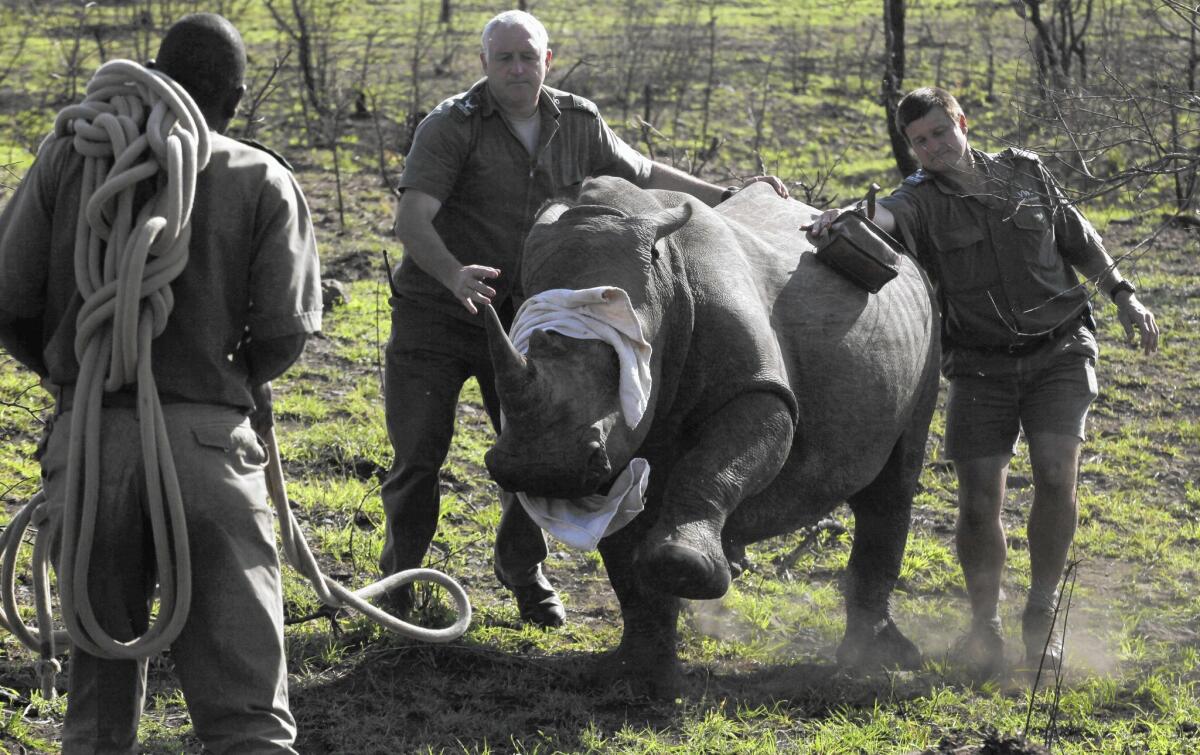Debate over rhino horn trade ramps up as South Africa ban is lifted

Reporting from JOHANNESBURG, South Africa — A South African court Thursday threw out a moratorium on the trade of rhino horns, a move hotly debated in a country that, more than any other, holds the survival of the species in its hands.
Proponents of lifting the ban argue that doing so will discourage illegal poaching that has steadily increased since the moratorium was enacted in 2009. Opponents say dropping the moratorium will place more pressure on stressed rhino populations.
An international ban remains, meaning South African farmers cannot trade with Vietnam or China, the principal markets for rhino horn.
“There’s no demand for rhino horn on the domestic market. If you have got no one to trade with you, it’s like the sound of one hand clapping,” said Tom Milliken, southern Africa director of Traffic, an organization opposed to trafficking in wildlife. But he warned that before the South African moratorium, privately owned South African rhino horn had found its way into the black market.
“What happened previously was that there were a lot of private sector abuses and many horns were ending up in the illegal trade,” he said.
The Convention on International Trade in Endangered Species, or CITES, has banned trade in rhino horn. South Africa, home to 80% of the global rhino population, has proved unable to stem a massive increase in rhino poaching since 2007, particularly in the Kruger National Park, which borders Mozambique.
The man who owns more rhinos than any other person on Earth, John Hume — who has about 1,200 of the lumbering, sensitive creatures — and another private owner and breeder, Johan Kruger, filed a suit in Pretoria’s high court calling on the government to lift the moratorium.
Judge Francis Legodi said the government had failed to follow the correct procedure when it brought in the moratorium on domestic trade. Minister of Environmental Affairs Edna Molewa said in a statement Thursday that the government would appeal the judgment, and once the appeal was lodged, the court order lifting the moratorium would be suspended until the appeal was heard.
The case underscores the determination of a powerful group of game farmers in South Africa to legalize the international trade, arguing it is the only way to save the species. They have been pressuring the South African government to present a proposal to CITES to legalize the trade when the convention meets in South Africa late next year.
Advocates of the rhino horn trade argue that unless the trade is legal, there will be no economic incentive for game farmers to spend millions guarding rhinos, making them too expensive to keep. They predict game farmers will simply dump their rhinos onto the market unless CITES legalizes the trade.
If trade were legalized, the argument goes, farmers could regularly harvest rhino horns from the living animals and sell them in markets such as Vietnam, where rumors have taken hold that the substance cures cancer. In China, rhino horn bracelets and other items have become status symbols for wealthy people.
Hume spends more than $2.9 million a year on security for his rhinos and $1.7 million on food, veterinary costs, staff and fencing.
He said he holds on to his rhinos because of “stupidity. You get into it and you get more and more passionate about it. You think that things are going to get better. And slowly you get so far into it, you can’t get out.”
If he wins the appeal, Hume hopes to sell about 300 rhino horns a year to members of the large population of Asian nationals living in South Africa to cover his rhino protection costs.
“I am completely convinced that what I am doing is the only way to save the rhino from extinction.
“There’s no doubt that if we sell rhino horn in South Africa, some people would try to smuggle it to Vietnam or China,” he said in an interview. “If we put 5 tons of horn into Vietnam in a single year, there’s no doubt in my mind that will diminish poaching in Kruger Park. It’s not whether we supply the trade but the way we supply the trade that is the problem.”
Milliken, of Traffic, said in an interview that it would be premature and potentially damaging to legalize trade in rhino horn, because there aren’t adequate systems in place in demand countries such as Vietnam and China to ensure that a legal horn wouldn’t feed the illegal trade, leading to even more pressure on rhino populations.
He said a better solution would be to reduce the demand for horn.
Any South African domestic trade would be regulated by government permits, although critics claim that the permit system governing trade in other wildlife species in South Africa is lax and corruption is common.
A 2012 report by Traffic on the global rhino trade found that when South Africa did allow domestic horn trade, before 2009, much of the privately owned horn went unaccounted for and may have ended up in illegal hands, trafficked outside the country.
It found that abuses and poor compliance in managing horn stockpiles in government and private hands had helped create a “perfect storm,” attracting criminal networks into lucrative rhino poaching.
However, Izak Du Toit, Hume’s lawyer, blames the moratorium.
“Prior to 2009, the amount of poaching in South Africa was extremely low. After the moratorium, the poaching cases skyrocketed,” he said in an interview.
Critics say the South African government lacks the will to stem rampant rhino poaching, but many factors come into play: corruption of some government officials, park rangers and police; huge returns from illegal trade in rhino horn; poverty-stricken communities surrounding Kruger National Park in both South Africa and Mozambique; and the long, porous, unfenced border between the park and Mozambique.
The number of rhinos poached rose sharply from 13 in 2007 to 83 in 2008, then again to 122 in 2009, and to 333 in 2010.
Last year, 1,215 South African rhinos were poached — one every seven hours — most of them in Kruger National Park. As the death toll crept embarrassingly higher, South Africa’s Department of Environmental Affairs stopped providing monthly updates.
But the Wildlife and Environment Society of South Africa, a nongovernmental organization, reports that more than 1,000 rhinos were killed from January to November, raising fears that this year’s toll could surpass last year’s.
With South African game ranchers pursuing the legalization of trade in rhino, Traffic and other groups are worried.
“If you agreed to a legal trade, it’s not clear that would save the rhino,” Milliken said.
“I’m not anti-demand reduction,” Hume countered. “If they win that battle, eventually there will be no poaching, and I won’t have to spend $40 million rand a year on security and I can just get on with my business.”
Twitter: @RobynDixon_LAT
ALSO
Hollande and Putin agree on closer anti-Islamic State coordination
Pope Francis calls for unity, links terror to poverty as he launches Africa tour
U.S. report on Afghan hospital attack ‘shocking,’ medical group says
More to Read
Sign up for Essential California
The most important California stories and recommendations in your inbox every morning.
You may occasionally receive promotional content from the Los Angeles Times.










